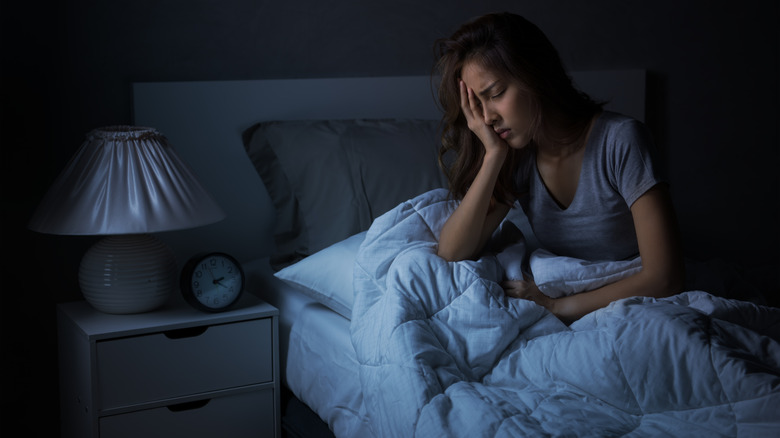The night is winding down and you’re trying to fall asleep, but your mind can’t stop entertaining intrusive thoughts. We’ve all had those nights, and it’s important to be able to recognize whether it’s an occasional issue or something that needs to be addressed.
Generally, someone must experience at least five depression symptoms every day for two weeks in order to be diagnosed with major depressive disorder (MDD), as explained by the National Institute of Mental Health (NIMH). Depression symptoms can occur at any point in the day, and they sometimes last all day. For some individuals, their depressive feelings worsen at night. Those who struggle with depression at night often experience rumination, which is a repetitive cognitive cycle of negative thoughts and feelings, according to Newport Institute.
Unlike the hustle and bustle of daytime, there’s less to distract the mind at night, which could contribute to rumination, as pointed out by Medical News Today. Without outside stimuli to occupy our thoughts, there can be a lot of room left open for all sorts of worries about the past, future, and everything in between.
Another contributor to nighttime depression is changes in the body’s circadian rhythm. One 2024 study published in Epidemiology discovered a link between daylight saving time and an increase in depressive episodes in the fall.
After learning about what causes nighttime depression, let’s take a look at what it feels like to be in the shoes of someone who experiences it.
What does nighttime depression feel like?

Without their loved ones around to distract them, many people who struggle with depression at night can feel a heavy sense of loneliness, according to Newport Institute. When someone feels lonely, they long for the presence of others, and feel down because they’re alone. Along with ruminating on one’s past mistakes and worrying about what needs to be done in the future, the combination of emotional states could feel like a waking nightmare to the person experiencing nighttime depression.
As pointed out by Charlie Health, some individuals with nighttime depression also have difficulty falling asleep because of their restless thoughts. This can cause them to become frustrated and anxious.
Having a restless night here and there isn’t uncommon, and there may not be much need to worry if it only happens once in a blue moon. But if nighttime depression has become a persistent problem for you, it’s a good idea to speak with a professional. You should also reach out to someone if you’re experiencing other symptoms of chronic depression. These symptoms include feelings of guilt and worthlessness, altered eating habits, and loss of interest in activities you used to find pleasurable, as described by BetterHelp.
How is nighttime depression treated?

If you notice that you’re having trouble with frequent late-night blues, reaching out to your doctor would be a good first step to finding the appropriate treatment option for you. With the support of your doctor, you can decide whether psychotherapy or medication management are treatments that you would like to pursue. For those who don’t respond to psychotherapy or medication, transcranial magnetic stimulation (TMS) is also an FDA-approved option for treating depression, as noted by Dr. TMS Therapy.
There are changes you can make to your daily routine that may ease some of your worries at night. For example, an excellent way to combat rumination is to journal about your intrusive thoughts throughout the day and before you go to bed (per Charlie Health). You can practice meditation to become more mindful of your negative thoughts and reframe those thoughts into more positive ones whenever they arise. Since blue lights can disrupt your sleep-wake cycle and contribute to insomnia, depression, and anxiety, it’s also wise to put your electronics away before bedtime, according to the Sleep Foundation.
If you or someone you know needs help with mental health, please contact the Crisis Text Line by texting HOME to 741741, call the National Alliance on Mental Illness helpline at 1-800-950-NAMI (6264), or visit the National Institute of Mental Health website.




